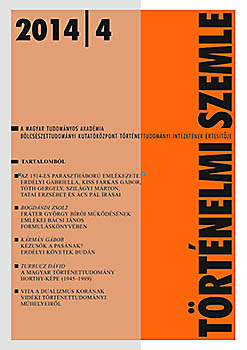Kézcsók a pasának? Erdélyi követek Budán
Kissing the Hands of the Pasha? Transylvanian Diplomats at Buda
Author(s): Gábor KármánSubject(s): Christian Theology and Religion, Geography, Regional studies, Diplomatic history, Culture and social structure , The Ottoman Empire
Published by: Magyar Tudományos Akadémia Bölcsészettudományi Kutatóközpont Történettudományi Intézet
Keywords: diplomacy; Buda; Transylvania; hierarchy; history;
Summary/Abstract: The paper addresses the question how the ceremonies surrounding the diplomatic contacts between the prince of Transylvania and the beylerbeyi of Buda mirror their place in the Ottoman international society. As rulers with (admittedly limited) sovereignty over their territories, according to a Christian European hierarchy, the former should have had a higher position than the latter, who functioned as local governors, deriving their power from the sultan’s authority. According to the rules of the Ottoman international society, however, this hierarchical difference did not exist: the princes of Transylvania also counted as the sultan’s servants and through the procedure of their investiture their rule was also based upon the padishah’s consent. An analysis of the Ottoman titulature of both dignitaries shows similar results to the earlier research on the Transylvanian princely insignia, that is that the princes were regarded to be on the same level as the beylerbeyi of Buda, who nevertheless had a prominent position among the Ottoman office-holders at the northwestern part of the empire. The ceremonies of the envoys’ reception at Buda show many similarities to the diplomatic rituals at the Sublime Porte. The exchange of gifts between the two sides (including the donation of kaftans by the beylerbeyi) also mirrors mutuality and no hierarchical difference between the princes and the pashas. Exactly this is why it is noteworthy that according to some reports the envoys kissed the hand of the beylerbeyi, which is a clear sign of subordination. A thorough analysis however, with comparative materials from Habsburg embassies and the Ottoman diplomacy of other tributary states at the province level shows that the envoys did not kiss the beylerbeyi’s hand in their quality as their ruler’s representative, rather in their own name – a peculiarity of the Ottoman international society in comparison to the Christian European one. The few personal meetings between the princes of Transylvania and the beylerbeyis of Buda included no such element of subordination.
Journal: Történelmi Szemle
- Issue Year: 2014
- Issue No: 04
- Page Range: 639-662
- Page Count: 24
- Language: Hungarian

